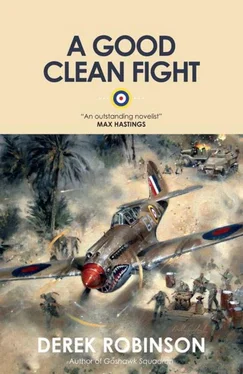“Who do you blame?” Dunn asked. “Luftwaffe Intelligence, or our admin?”
“Keep still.” Gibbon got up, stood on Dunn’s shoulders, balanced for a second, and dived in. The kick-back sent Dunn sprawling.
* * *
The two Curtiss P-40 Tomahawks were on their way home when they met six Macchi 202s flying in the opposite direction.
The Italian machine was a more advanced fighter, with a greater rate of climb. The Tomahawk was more rugged, could take more punishment, and at lower levels it could out-turn the Macchi. The Tomahawk had six machine guns; the Macchi had two, plus two cannon. Both formations were at about eight thousand feet; at that height the types more or less matched each other in performance. So it came down to the caliber of the pilots. In general, Macchi 202 pilots were good.
Flight Lieutenant Michael Melville led the pair of Tomahawks. He was a Canadian who had flown with the Desert Air Force for nearly a year and he had scored five kills. His wingman was Sergeant-Pilot James Blunt, from Scotland. Six months in the desert, no kills. Destroying enemy aircraft was not his prime job. He was there to guard Melville’s tail and leave Melville free to do the damage.
The Italians divided. Three climbed steeply. The other three made straight for the enemy.
Both Melville and Blunt had experienced a flutter of fear when they first saw the pattern of dots and knew what it meant. Melville’s heart began a runaway pounding, while Blunt’s stomach lurched toward sickness. The sensations were familiar and they vanished quickly. When he first flew on operations, Blunt had been worried by this fact of fear, but Melville had told him that every pilot suffered a bit of twitch before combat, and now Blunt no longer worried. His stomach settled down as the dots began to magnify.
This happened fast. The closing speed was over six hundred miles an hour and the sleek, slippery shape of the 202, like a Spitfire crossed with a 109, soon became clear. Melville’s reflector sight was switched on, the gun-trigger on his joystick was set to fire, his straps were tightened, his seat slightly lowered to create more protection from the back-armor. No need for him to tell Blunt anything. They had flown as a team too long for that. Now the enemy colorings were visible: sand-brown with olive-green splotches, white spinner and wingtips. The three climbing fighters showed blue-gray undersurfaces. Blunt automatically searched the rest of the sky. Empty. The odds were six-to-two, but Italian pilots were not famous for long air battles. They usually scrapped briskly and departed. Anyway, if the fight went badly for the Tomahawks the answer was to shove the stick hard forward. The Tomahawk could dive like a truckload of bricks.
Melville led Blunt into a head-on attack which was calculated to test the Italians’ resolve. For a couple of seconds the air sparkled with tracer and then the enemy had whipped past. Melville was bending into a hard left turn and as Blunt followed he felt his machine bounce a little on the Italians’ slipstreams.
The turn tightened, dragging his guts down and sucking the blood from his brain. This was all very familiar. Up ahead, Melville’s eyes were browning-out too, but he forced the turn until his fingertips prickled and the aircraft was flirting with a skid. When he straightened out, the three Macchis were a mile away, still turning.
The skid that Melville had avoided caught Blunt. Briefly his controls felt sluggish and he knew the wings had lost some of their grip on the air. When he could see clearly again he had drifted far from his leader. At once he searched the sky above. Nothing. That was wrong. He looked at his leader and saw two Macchis pull out of a swooping dive and close on him from beneath. “Break left!” he shouted. And turned hard into them, to scare them off with a long-range burst. He fired, the whole scene blurred and shuddered. When he released the trigger the enemy had gone but the other Tomahawk was in his gun-sight and it was ablaze.
Blunt was so shocked that for a moment he could only stare. A long moment, perhaps four or five seconds. Long enough for an Italian pilot to swing behind him and pump two or three cannon shells into the left wing-root of the Tomahawk. The wing detached itself as if perforated. The rest of the aircraft fell in a fast and giddy spin that nailed Blunt to his seat.
The six Macchis resumed their original formation and circled the columns of smoke while their leader noted the time and place for his combat report. Then they cruised home.
The adjutant waited two days before he emptied Melville’s and Blunt’s tents, just in ease they walked in from the desert. He waited two more days and then sent all their belongings to the Committee of Adjustment in Cairo. He didn’t know what happened to the stuff after that and he didn’t care. He was just glad the whole sorry affair could be forgotten. In James Blunt’s case that was not easy: he had been bright and amusing and on the edge of promotion. However, the adjutant had won his wings in the Royal Flying Corps in 1917, and so he had considerable experience in how to forget men.
The squadron he had joined then was called Hornet Squadron and it was called Hornet Squadron now. It was led by a New Zealander, Squadron Leader Fanny Barton. On the day the two pilots’ belongings were packed off to Cairo, Barton got a telephone call from Wing HQ. An hour later he was in the wing commander’s office, which was a captured Italian army trailer, slightly bullet-holed, previously owned by a small general. The doors and windows were wide open and a teasing breeze wandered through from time to time, swapping static heat for moving heat. It rattled the papers on the table, papers held down by the nose cone of a shell or a hunk of shrapnel or an infantry dagger, and then it faded away as if exhausted by its own tiny effort. “I was at a meeting yesterday, Fanny,” the wing commander said, “and if a vote had been taken, you would have got the chop.”
It took a few seconds for the full meaning to sink in. “I’d have lost the squadron?” Barton said.
“You’d be flying a desk in Cairo. The Desert Air Force has a small glut of chaps eminently qualified to do your job and itching to get their hands on it, this being the only fighter war of any consequence outside Russia. Or the Pacific, I suppose. Would you like to go back there? Defend New Zealand from the yellow peril? No, I thought not. And I can tell from your cross-eyed expression that you wish to know why the chop should fall on you.”
“I certainly bloody well do.”
“It’s because your squadron hasn’t scored in a month. And the month before that wasn’t very brilliant either. Don’t kick the table, Fanny,” the wing commander said patiently, “you’ll only spill the ink.”
“Sorry, sir,” Barton said. “I meant to kick the waste basket. Must have missed.”
“Yes. That’s your problem nowadays, isn’t it? Missing things.”
“We can’t hit what isn’t there.”
“Other squadrons seem to manage it.”
“My boys have seen exactly four enemy aircraft in the last three weeks, fired their guns once, couldn’t get anywhere near the rest. Jerry’s got the legs of us whenever he likes.”
“That’s not quite the full story, is it?” The wing commander scrabbled among some papers and found a crumpled carbon copy. “I take it Melville and Blunt can be written off?” Barton nodded. “And a couple of weeks ago you lost… who was it?”
“Shepherd and…” Barton squeezed his face to make his memory work. “Pelican. No, not Pelican, that’s what the boys called him. Pelligrin. He was French. They collided on takeoff. Sheer bad luck.”
“Some squadron commanders are unlucky. At least, that’s what yesterday’s meeting seemed to think. And the meeting wasn’t in a mood to hang around waiting for your luck to change. My guess is you’ve got a week, at most.”
Читать дальше












